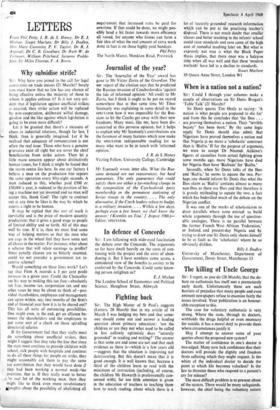Fighting back
Sir : The High Master of St Paul's suggests (Letters, 28 March) that in my article of 14 March I was hedging my bets and that some- one should come out and answer a leading question about primary education: 'are the children or are they not what used to be called in less callowly optimistic days "securely grounded" in reading and writing?' The answer is that some are and some are not and that such evidence as there is—which is a few years old —suggests that the situation is improving not deteriorating. But this doesn't mean that it is good enough. It is well known that, because a third of the children learn to read with the minimum of instruction (including, of course, the children Mr Howarth is professionally con- cerned with), far too little attention is given in the education of teachers to teaching them how to teach reading, about which there is a
lot of 'securely grounded' research information which can be put at the practising teacher's disposal. There is not much doubt that smaller classes and better teaching in the infants' school could raise standards and save some of the high cost of remedial teaching later on. But what is expressly not true is what the Black Paper thesis implies, that there once was a halcyon tin e when all was well and that these 'modern methods' have led to a decline in standards.


































 Previous page
Previous page